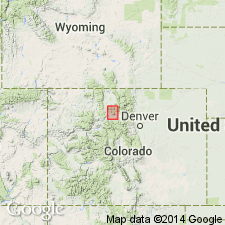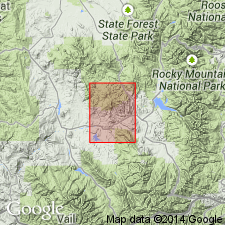
- Usage in publication:
-
- Rabbit Ears Volcanics*
- Modifications:
-
- Original reference
- Dominant lithology:
-
- Volcanics
- AAPG geologic province:
-
- North Park basin
Summary:
Rabbit Ears Volcanics. Extrusive volcanic rocks. Includes (1) a thin lower unit of olivine-bearing trachybasalt flows, the Pete Gulch Member of probable Oligocene age, 0 to 200 feet; and (2) a thick upper part composed of intercalated tuff, breccia, and lavas of silicic to intermediate composition, 0 to 800 feet. In most areas unconformably overlies rugged erosion surface cut on Middle Park Formation and older rocks. Locally overlain by Troublesome Formation (Miocene) or by Grouse Mountain Basalt (new; Pliocene?). Age is considered Oligocene and Miocene(?). Sample from a rhyolite welded tuff breccia near middle of formation yielded a K-Ar age of 33 +/-3 Ma (sanidine).
Type area: Rabbit Ears Range, Continental Divide, Grand Co., northwestern CO.
Source: Publication; US geologic names lexicon (USGS Bull. 1350, p. 608).

- Usage in publication:
-
- Rabbit Ears Volcanics*
- Modifications:
-
- Areal extent
- AAPG geologic province:
-
- North Park basin
Summary:
Extends from the crest of the Rabbit Ears Range south into Middle Park. Covers uplands north of Colorado River (geologic map) in the central and northern parts of the quad, Grand Co, CO, North Park basin. Is thin (0-100 ft) in southern outcrop area where it fills in lows on the depositional surface. May be as much as 800 ft thick in northern part of quad. Composed chiefly of complexly layered fragmental volcanic rocks and a few thin discontinuous trachyandesite and trachybasalt lava flows. Fragmental rocks include breccia, tuff breccia, and tuff. Main breccia and five units mapped. Of these the only formal unit is the Pete Gulch Member at base on west edge of quad. Is younger than Middle Park Formation and older than Troublesome Formation. Chemical analyses. Oligocene and Miocene? age.
Source: GNU records (USGS DDS-6; Denver GNULEX).
For more information, please contact Nancy Stamm, Geologic Names Committee Secretary.
Asterisk (*) indicates published by U.S. Geological Survey authors.
"No current usage" (†) implies that a name has been abandoned or has fallen into disuse. Former usage and, if known, replacement name given in parentheses ( ).
Slash (/) indicates name conflicts with nomenclatural guidelines (CSN, 1933; ACSN, 1961, 1970; NACSN, 1983, 2005, 2021). May be explained within brackets ([ ]).

